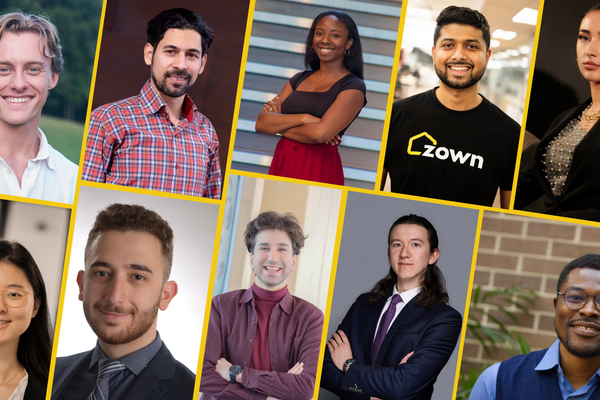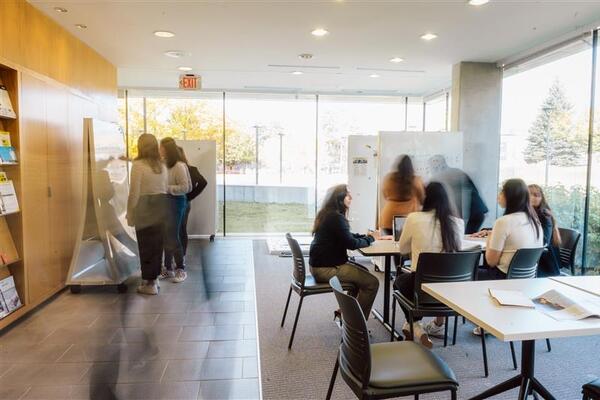
Three things you didn’t know about starting a business
Cam Mills (BSc ’18), co-founder and COO of Terrene, says that sometimes it’s better to break the rules.

Cam Mills (BSc ’18), co-founder and COO of Terrene, says that sometimes it’s better to break the rules.
By Claire Mastrangelo and Robin Morden Office of AdvancementWhen it came to launching a successful business, Cam Mills didn’t always do things by the book. The co-founder and COO of Terrene charted his own path as he built, scrapped and rebuilt his growing company.
With help from Waterloo’s Velocity programs, the Accelerator Centre and the New York accelerator Techstars — as well as the Communitech Data Hub, where Terrene is now based — Cam and his co-founders built a company to help experts in various fields analyze data and make predictions using machine learning. The businesses using their tool range from startups to Fortune 100 companies.
Here are three surprising lessons from Cam to help readers on their own entrepreneurial journey.
1) You don’t need to be an expert in your field.
Cam majored in Science and his co-founder Francois le Roux majored in Environment and Business. They recruited a Math student, computer scientist Kash Pourdeilami, to do the programming.
Cam found that his lack of expertise gave him keen insight into his customers’ needs — essentially, he was his ideal user. As a newcomer to data analytics, he also brought a fresh perspective to the field.
“If you've learned too much about what's been done before, it’s easy overlook new ways of doing things,” he says.
2) Don’t focus on a solution — at least, not at first.
Too many entrepreneurs approach the innovation process backwards, says Cam. They start with a solution and then look for the problem it solves. As a result, they develop products that solve insignificant problems and have little commercial potential.
How do you identify an important problem? Cam recommends talking to a lot of customers.
“The key is talking to more customers than you think is necessary,” he explains. “You do this until you have identified not only the problem, but also a distinct market.”
Francois Le Roux pitches at the Velocity Fund Finals in the winter of 2017.
3) Take “no” for an answer.
Entrepreneurs are famous for persevering even when no one believed in their ideas. However, Cam says it’s important to recognize when you need to change course.
“Everyone thinks they have the best idea,” he says. “So when someone tells them they should change it, they say, ‘No, I’m right.’ ”
But listening to criticism with an open mind is essential. Cam says it can help you identify and fix key flaws with your product.
4) BONUS TIP: Find a community of entrepreneurs.
Being an entrepreneur can be isolating, even lonely, says Cam. “Often, it’s just you and your co-founders working together for 15 hours a day. You can bounce ideas off each other, but when you’re all stuck, you need somewhere else to go.”
When Cam and his team ran into difficulties, they turned to the community at Velocity, Waterloo’s world-renowned startup incubator, for help.
“It was amazing and really helpful to talk to people from other companies who have different perspectives and who make time for you because they also understand the struggles of being in a start up,” Cam says.
That community — combined with great ideas and a willingness to adapt — enabled Cam and his colleagues to succeed.

Read more
Here are the people and events behind some of this year’s most compelling Waterloo stories

Read more
From transforming solutions for homeownership to advancing health care interventions, Waterloo talent continues to disrupt industries and drive change

Read more
True North Fund partners with Waterloo to develop a Canadian talent pipeline to help strengthen the country’s top 100 tech firms
The University of Waterloo acknowledges that much of our work takes place on the traditional territory of the Neutral, Anishinaabeg, and Haudenosaunee peoples. Our main campus is situated on the Haldimand Tract, the land granted to the Six Nations that includes six miles on each side of the Grand River. Our active work toward reconciliation takes place across our campuses through research, learning, teaching, and community building, and is co-ordinated within the Office of Indigenous Relations.